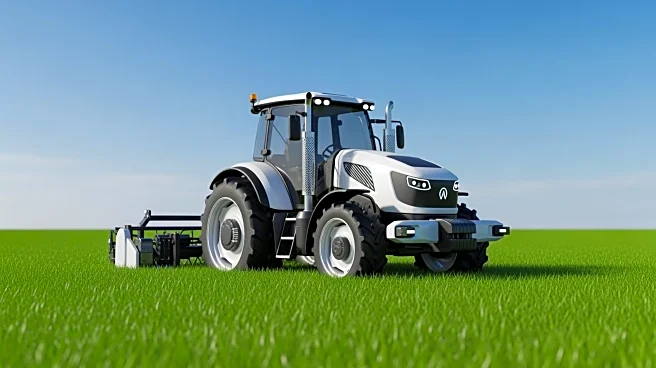What's Happening?
John Deere is advancing its agricultural machinery by integrating digital technology to create autonomous tractors and cleaner power systems. This initiative, described as a 'tech staple' approach, aims
to enhance efficiency and provide sustainable solutions for the decreasing number of farmers and farm workers tasked with meeting the increasing global food demand. Justin Rose, President of John Deere’s Worldwide Agriculture & Turf Division, highlighted these developments at the Agritechnica 2025 trade fair in Hannover, Germany. The company is focusing on improving internal combustion engines while also investing in renewable fuels and electric alternatives. These innovations are designed to offer farmers flexibility in choosing power options that align with environmental standards. John Deere is also showcasing an electric tractor prototype, powered by Kreisel batteries, capable of performing tasks without emitting greenhouse gases.
Why It's Important?
The introduction of autonomous and eco-friendly farming technology by John Deere is significant for several reasons. It addresses the critical need for increased agricultural efficiency and productivity in the face of a declining workforce. By offering renewable and electric power options, John Deere is contributing to the reduction of carbon emissions, aligning with global environmental goals. This move could set a precedent for the agricultural industry, encouraging other companies to adopt similar technologies. Farmers stand to benefit from reduced operational costs and compliance with environmental regulations, potentially leading to more sustainable farming practices. The broader impact includes a potential shift in agricultural policies and increased investment in green technologies.
What's Next?
John Deere's advancements in autonomous and eco-friendly technology are likely to influence future agricultural practices and policies. As these technologies become more widely adopted, there may be increased pressure on other agricultural machinery manufacturers to develop similar solutions. Farmers and industry stakeholders will be closely monitoring the performance and cost-effectiveness of these new technologies. Additionally, there could be further developments in renewable energy sources and battery technology, enhancing the capabilities and appeal of electric tractors. The success of these innovations may also lead to increased research and development in other areas of sustainable agriculture.










